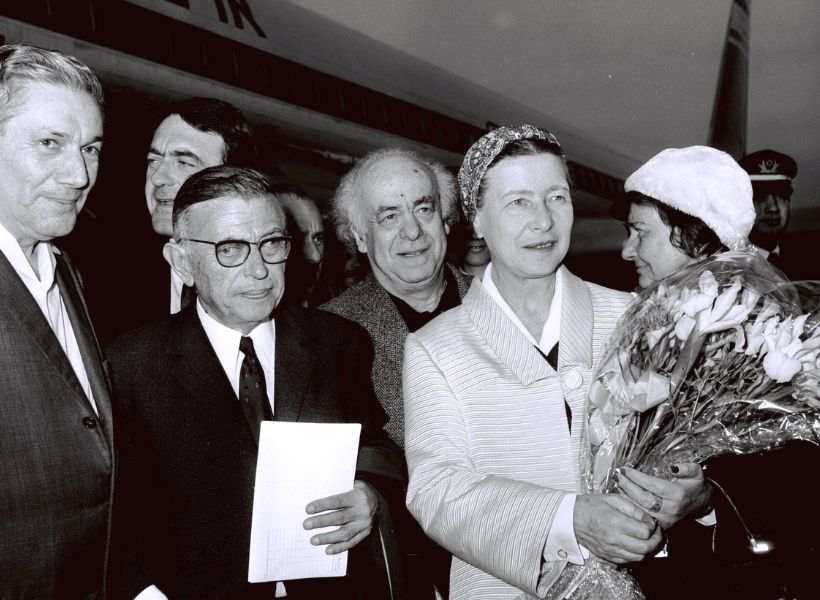This post contains affiliate links, meaning I get a commission if you decide to make a purchase through my links, at no cost to you. Please read my disclosure page for more details.
Categories: French Culture, French History
This episode features our frequent and very popular guest Elyse Rivin. If you enjoy her episodes, please consider supporting her on Patreon.
Who Was Simone de Beauvoir, and Why Does She Matter Today?
In episode 528 of the Join Us in France podcast, host Annie Sargent and Elyse Rivin dive into the fascinating life of Simone de Beauvoir, one of the most influential feminist thinkers of the 20th century. Simone de Beauvoir was a prolific writer, philosopher, and activist whose ideas challenged societal norms and paved the way for modern feminism. But her life was far from simple, and her legacy remains both inspiring and controversial.
Get the podcast ad-free
Early Life and Education
Simone de Beauvoir was born in 1908 into a conservative Catholic family in Paris. From a young age, she demonstrated exceptional intellectual abilities, excelling in her studies and declaring her ambition to become a writer. Despite her traditional upbringing, she rejected the constraints placed on women at the time and pursued philosophy, eventually earning the prestigious agrégation, France’s highest teaching qualification.
During her studies, she met Jean-Paul Sartre, a fellow philosopher who became her lifelong partner. Together, they formed an intellectual power couple, delving into existentialism, literature, and political activism. Their unconventional relationship and shared commitment to intellectual freedom fascinated and scandalized their contemporaries.
A Trailblazer in Feminism
Simone de Beauvoir’s most famous work, The Second Sex (Le Deuxième Sexe), remains a foundational text in feminist philosophy. Published in 1949, the book examines the ways in which women have been historically oppressed and argues for their intellectual and social emancipation. Her famous statement, “One is not born, but rather becomes, a woman,” challenges the idea that gender roles are natural or fixed.
Annie and Elyse explore how The Second Sex was groundbreaking at the time of its publication. It tackled taboo topics like women’s sexuality, reproduction, and societal expectations with unapologetic honesty. Elyse explains how the book sparked fierce debates, both for its radical ideas and for its unflinching critique of patriarchal norms. It was controversial, but it also inspired generations of women to question the status quo.
Controversies and Contradictions
Simone de Beauvoir’s personal life was as complex as her ideas. She rejected traditional roles for women, such as marriage and motherhood, and maintained a lifelong partnership with Sartre without ever marrying him. However, her libertarian approach to relationships and her involvement with students as a teacher have sparked criticism over the years. Annie and Elyse discuss these contradictions, noting how her actions sometimes conflicted with her principles.
Her political activism also stirred debate. She and Sartre supported communist ideologies, even aligning themselves with controversial regimes. Elyse explains how this political stance tarnished their reputations in some circles, particularly as the darker realities of these regimes came to light.
A Life Lived in Montparnasse
Simone de Beauvoir spent much of her life in Paris, particularly in the Montparnasse neighborhood. Annie shares how this area was central to her intellectual and social life. She lived near iconic spots like La Rotonde and Café de Flore, where she and Sartre discussed philosophy and politics with other notable thinkers of the time. Today, visitors to Paris can explore Montparnasse and visit her final resting place in the Montparnasse Cemetery, where she lies beside Sartre.
Why Simone de Beauvoir Still Matters
Simone de Beauvoir’s ideas remain relevant today. From gender equality to personal freedom, her writings address issues that continue to shape modern society. Annie and Elyse reflect on how her work influenced not just feminism but also literature, philosophy, and political thought. Elyse highlights how her writings, though decades old, still resonate with readers grappling with questions of identity and equality.
Listen to the Episode
If you’re curious about Simone de Beauvoir’s life, work, and lasting impact, this episode is for you. Annie Sargent and Elyse Rivin bring her story to life, blending historical context with insightful commentary. They don’t shy away from the complexities of her character, making this an engaging and thought-provoking listen.
Dive into episode 528 of the Join Us in France podcast to learn more about Simone de Beauvoir and why her legacy endures. Whether you’re a fan of French history, feminist philosophy, or Parisian culture, this episode offers something for everyone.
Don’t miss it! Listen now and explore the extraordinary life of Simone de Beauvoir.
Table of Contents for this Episode
#SimoneDeBeauvoir, #FrenchHistory, #Feminism, #TheSecondSex, #Philosophy, #FrenchCulture, #JeanPaulSartre, #Existentialism, #FrenchIntellectuals, #WomenInHistory, #PodcastEpisode, #JoinUsInFrance, #TravelPodcast, #FrenchLiterature, #ParisHistory, #WomenEmpowerment, #Montparnasse, #FeministIcon, #LearnAboutFrance, #ExploreFrance
More episodes about French history
FOLLOW US ON:
Discussed in this Episode
- Simone de Beauvoir
- Jean-Paul Sartre
- Paris
- Montparnasse
- La Rotonde
- Café de Flore
- Montparnasse Cemetery
- Saint-Germain-des-Prés
- La Sorbonne
- Albert Camus
- Boris Vian
- Yves Montand
- Simone Signoret
- Mao Zedong
- Stalin
- Nelson Algren
- Emmanuel Macron
- Germaine Greer
- Doris Lessing
- Anaïs Nin
- Henry Miller
- Madame Curie
- Christine Lagarde
- Simone Weil
- Algeria
- Radio Vichy
- China
- Soviet Union
- Rhodesia (Zimbabwe)
- England.
Subscribe to the Podcast
Apple YouTube Spotify RSSSupport the Show
Tip Your Guides Extras Patreon Audio Tours
Read more about this episode
TranscriptCategories: French Culture, French History



